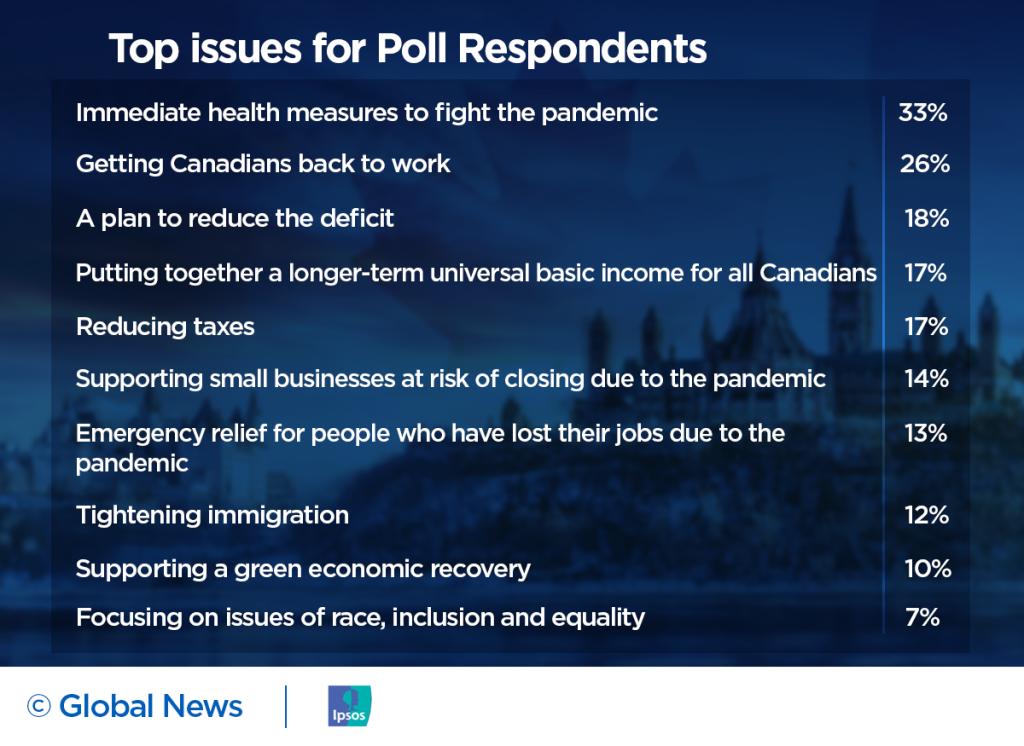By: Kerri Breen. –
Canadians want Ottawa to stay focused on the coronavirus pandemic and the economy during the new session of parliament, according to a new poll from Ipsos.
“The biggest priority item for Canadians, they tell us, is support for health care initiatives to fight COVID. And then after that, it’s pretty much dominated by anything to do with the economy,” said Darrell Bricker, CEO of Ipsos Public Affairs.
“That includes, most importantly, creating jobs and helping Canadians with jobs. But they’re also concerned about taxes and the deficit.”
Ipsos recently asked 1,000 respondents to think about the upcoming speech from the throne and pick up to two main priorities out of a dozen topics.
Thirty-three per cent chose immediate health measures to battle COVID-19, and 26 per cent said getting people back to work.
The next most commonly cited concern was a plan to tackle the ballooning federal deficit, at 18 per cent,
…cutting taxes, and, introducing a universal basic income program were tied at 17 per cent.

The throne speech — which is delivered by the governor general but comes from the government — is set for Wednesday.
It will lay out the government’s vision for the new session of parliament.
Intergovernmental Affairs Minister Dominic LeBlanc shed some light on the Liberals’ priorities in an interview on The West Block Sunday.
“We’ve been saying very clearly that the pandemic and the health and safety of Canadians is the priority,” he told Global News Ottawa bureau chief Mercedes Stephenson. “So, people shouldn’t be surprised that the government’s focus will be squarely on that.”
“But as I’ve said, they also expect the government to focus on issues as important as climate change and a successful economic recovery. We’ll be speaking to those issues as well in the throne speech.”
Since the Liberals have a minority of seats in the House of Commons, the party will need the support of another in order to remain in power.
That means, in addition to appealing to their own supporters, the Liberals will need to consider the other parties and their bases, Bricker said.“If you’re a government that’s trying to stay alive, in the sense of being in a minority and not wanting to face an election, you’re going to have to probably find something that fits under those priorities, that directly appeals to the supporters of other parties,” Bricker said.
While the poll revealed that Canadians’ priorities were roughly similar, there were some key differences among supporters of the main political parties.
The most common priorities among NDP voters were fighting the pandemic at 37 per cent, universal basic income at 26 per cent, issues of race, inclusion and equality at 18 per cent.
Liberal supporters chose COVID-19 health care efforts at 43 per cent, followed by restoring employment at 27 per cent, and aid for those who have lost their jobs at 19 per cent.
Conservative voters, however, had a stronger focus on the economy.
Thirty-five per cent of Tories included getting Canadians back to work among their top two issues, followed by tackling the deficit at 31 per cent. Health measures to fight the pandemic came in at 25 per cent.
While climate change — and measures to tackle it such as the carbon tax — dominated the political landscape prior to the pandemic, the Ipsos poll suggested those concerns are on the backburner as society deals with the health and economic effects of the coronavirus crisis.
Just 10 per cent of respondents chose supporting a green economic recovery among their top two priorities. But that could shift once the pandemic subsides.“It’s not as though people don’t care about the environment or their level of concern isn’t as great as it’s been,” Bricker said. “It’s just been blocked out by something that’s become more urgent.”
__________________________________________________
This Ipsos poll was conducted between September 11 and 14, 2020, on behalf of Global News. For this survey, a sample of 1,000 Canadians aged 18+ was interviewed online. Quotas and weighting were employed to ensure that the sample’s composition reflects that of the Canadian population according to census parameters. The precision of Ipsos online polls is measured using a credibility interval. In this case, the poll is accurate to within ± 3.5 percentage points, 19 times out of 20, had all Canadians aged 18+ been polled.




















